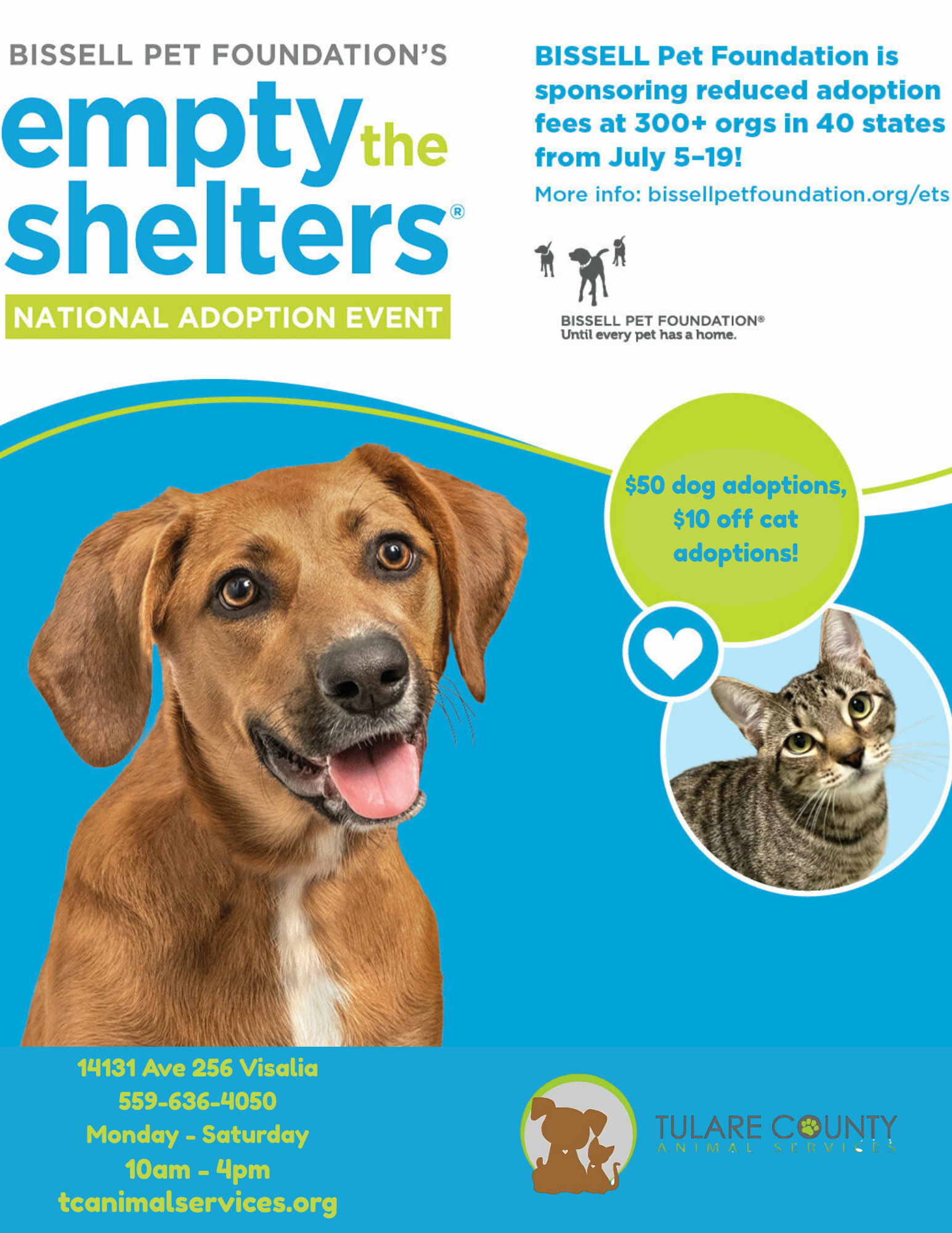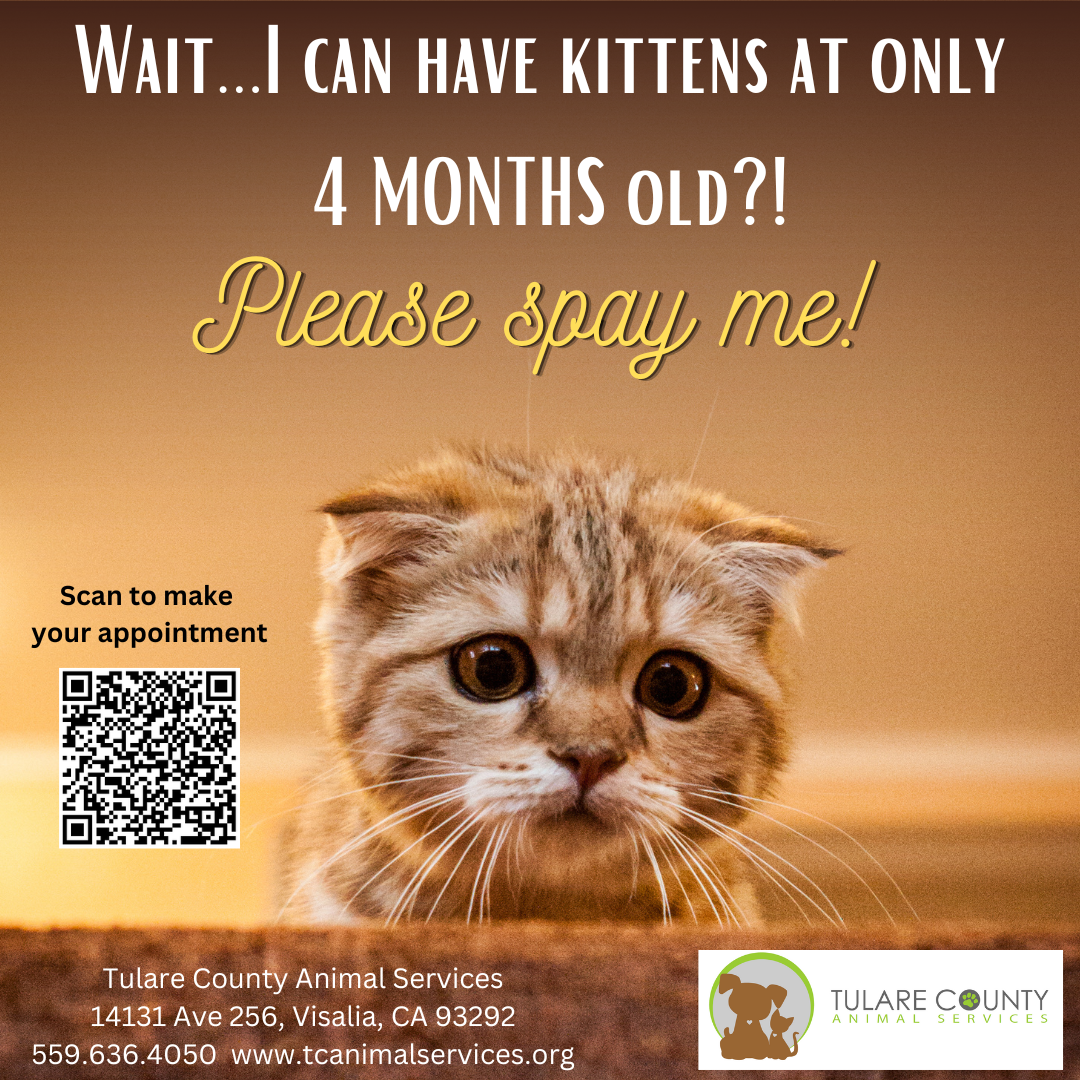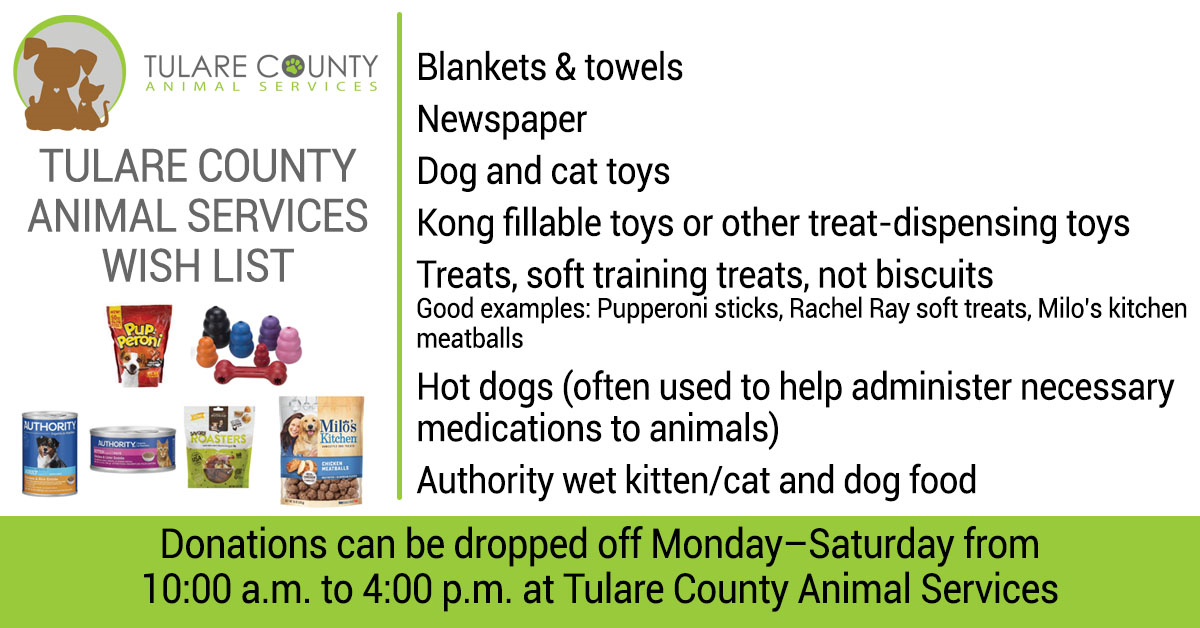


BISSELL Pet Foundation, a national animal welfare organization dedicated to ending pet homelessness, is once again prompting a nationwide call for adoption through its “Summer National Empty the Shelters Event” with reduced-fee adoptions from July 5-19. Tulare County Animal Services will participate along with 300+ shelters across 40 states to help pets find loving homes through reduced adoption fees, generally sponsored by BISSELL Pet Foundation.
Tulare County Animal Services will be reducing their dog and cat adoption fees for animals adopted at our shelter.
All dog adoptions will be $50 (regular price $90-$100)
(An $8 dog licensing fee applies to all residents who live in the unincorporated areas of Tulare County).
All cat adoptions will be $10 off
Please check under our "Available Pets" for the dogs and cats we have available for adoption. If a cat or kitten is located at PetSmart in Visalia or in a foster home, the staff notes under the animal information will show this.
We are open for adoptions Monday - Saturday from 10 am - 4 pm. Appointments are encouraged but are not required. If you have any questions please call us at (559) 636-4050 x 0.
.png)
Tulare County Animal Services (TCAS) is hosting a FREE Cat Vaccine Clinic on Sat., July 19, from 9:00 a.m. – 1:00 p.m. (by appointment only) at our Spay/Neuter Clinic at 14131 Ave 256, Visalia. This is for Tulare County residents only. It is encouraged to register now at sfspca.org/centralvalleyappts. Please arrive by your scheduled appointment time. Cats must be handleable - no feral cats. Cats must be in carriers. The clinic will offer free FVRCP + Rabies Vaccines. This is not an HHSA/Tulare County event but TCAS is partnering with SFSPCA and will be on site. Flyers: English | Spanish
Interested in making a donation? TCAS is always in need of supplies and items to give extra love to our sheltered pets. Click here to see our wish list on Amazon or click here to download the wish list for our Tulare County Animal Shelter: You can simply drop off your donations Monday - Saturday from 10:00 a.m. - 4:00 p.m. at Tulare County Animal Shelter located at 14131 Ave 256 in Visalia.
Animal Services has two older kittens they are trying to find a home for. They are a bonded pair, and we do not want to separate them. They are currently in a foster home and are looking for their forever home.
Blaze (A241675) was born at the shelter to a stray feral cat. He has been in a foster home since he was a little kitten. Neptune (A241273) was born to a different feral mom. He and his siblings went to a foster home for a little more socializing. He got a little sick and spent some extra time at his foster home. While in the foster home, these two kittens bonded, and we do not want to separate them. Little Blaze wasn’t fully developed, so he couldn’t get neutered when he was younger. His foster mom didn’t mind keeping him longer. These two boys are now about 8 months (Blaze) and 11 months old (Neptune). They have been together for months. If you would be interested in adopting them and want to visit them, please call the shelter at (559) 636-4050 x 0, and we can arrange with their foster parent to bring them to the shelter. And we are doing a 2-for-1 adoption special for them. Their adoption fee will only be $70. They are both neutered, vaccinated, and microchipped. They are great with people and other cats. They have not been around any dogs or children yet.

Tulare County Animal Services has a limited number of spay and neuter appointments for cats. To sign-up for an appointment, click the link below. Once you have registered your pet, you will receive further instructions and a link to our Surgery Consent form via email. If you have any questions please call us at (559) 636-4050 x 0. If the calendar is not showing any available appointments, please check back later.
We have a limit of 2 appointments per person or address per day.
If you are unable to make your scheduled appointment, please call the shelter at (559) 636-4050 x 0 or email tcanimalservices@tularecounty.ca.gov at least 24 hours prior to your scheduled appointment. Tulare County Animal Services reserves the right to refuse appointment requests for anyone who has missed an appointment. Thank you for your understanding.
Tulare County Animal Services is looking for Kitten Fosters!
As the weather is warming up, we are seeing more kittens who are in need of foster homes. TCAS is in need of foster volunteers willing to open their homes to kittens ranging from newborn to 12 weeks old. Ideally, we want them to be in the foster home until they are old enough to be spayed/neutered (2 lbs/2 months). We provide all the necessary supplies, guidance, and support to make your fostering experience smooth and fulfilling.
If you have a warm space, some extra time, and lots of love to give, we'd love to hear from you! Here is a link to our foster application: Foster Application
If you have filled out an application in the past, please let us know if you are still interested in fostering. We want to make sure we have your correct phone number and email address. Feel free to call the shelter at (559) 636-4050 x 0 or email us at tcanimalservices@tularecounty.ca.gov.
For more information on fostering, please click here: Foster Information


You can sign up to take one of our amazing dogs out for the day and go out on an adventure! Our wonderful dogs could use a break from the shelter and as a participant there is no longer term commitment. If you are 18 years of age or older you can sign up and bring your friends or family along for the journey. Dogs are checked out Friday - Saturday from 9 am - 10 am depending on the time you sign up, then just bring the dog back by 2 pm that same day. We send you with all the gear you will need for your adventure together, just take a few photos and let us know how they did! You can help us promote and find homes for our amazing dogs.
Follow the link below to sign up for a date and time to pick up a dog!
Tulare County Animal Services Division places hundreds of shelter animals in new homes with adopters who are looking for a fantastic pet. The animal adoptions program is spearheaded by staff and volunteers who coordinate adoption events, sponsorships, and volunteer assistance. The adoptions program includes finding foster parents who are able to temporarily care for shelter animals at their homes, giving animals time to grow, socialize, and receive personalized attention and care in a family environment before going to their “forever home.” Moms with litters have a chance to raise their puppies and kittens away from a shelter setting, enabling them to have more contact with people, children, and other animals.
The Animal Adoption Fund offsets the costs of adoption, including spay/neuter expenses, vaccinations, microchips, and dog licensing, by sponsoring either the full or partial adoption costs. This is especially helpful with the hard-to-place animals, older animals, those needing special medical treatment, and those needing extra help finding a permanent home. Animal Services holds special adoption events throughout the year to promote adoptions and pet ownership.
Animal Services has the following responsibilities: Maintaining the health and safety of the animals in their care and custody; overseeing the dog licensing program for county residents; providing outreach and education services; and responding to public complaints, reports of vicious animals, dog bites, and animal neglect cases. Animal Services’ primary goal is to find new homes for shelter animals through adoptions, foster parents, and rescue groups.
The Animal Services General Fund is used for purchasing educational materials; covering expenses associated with providing low-cost vaccination and microchip clinics to the county’s rural communities; purchasing general supplies to improve the animals’ health; transporting animals to rescue organizations; and for various other items to enhance the program’s education and outreach efforts.
Tulare County is a large county with pets in many households. For some people, accessing veterinary care or having their animals spayed or neutered and vaccinated can be difficult to afford. The Animal Services Spay/Neuter Fund provides reduced-cost spay/neuter vouchers. It also brings mobile spay/neuter clinics to small communities with no access to veterinary care and facilitates a trap, neuter, and release (TNR) program for community cats.
Tulare County Animal Services has identified items utilized within the Shelter on a daily basis to provide a higher level of care to the animals under our care and custody.
Please click here for Tulare County Animal Services “Wish List” on Amazon Smile
Donations are always welcome and greatly appreciated! Our "wish list" items are:

Click here to print a pdf version of the Wish List.
Tulare County Animal Services (TCAS) now has their Stray Animal Form online. By completing this form, the information will be emailed to the shelter and this will eliminate the need to fill out paperwork once you arrive at the shelter. TCAS accepts stray dogs and livestock, as well as sick and injured cats from the unincorporated areas of Tulare County only. We do not accept healthy cats for intake but please ask about our trap, neuter, and return programs for community or feral cats.
For the Stray Animal Form and more information on shelter hours please click here.
If you are wanting to have a stray animal picked up instead of bringing the animal in, please click here for the Animal Complaints page.
Tulare County Animal Services provides dog licensing services for all of the unincorporated areas of Tulare County. If your dog gets lost, a valid license will identify the dog and his/her owner and allow us to reunite lost pets with their owners. Having your dog licensed also shows that your dog has a current rabies vaccination. Plus, dog licensing is the law.
To make the process easier, Tulare County Animal Services is now accepting online payments for dog licensing. Both new and renewal dog licensing can be done online along with updating information on your dog.
If you are not sure if your address is in the city limits or county please click on the Tulare County Elections website and enter your address. If you live within the city limits of Dinuba, Exeter, Farmersville, Lindsay, Porterville, Tulare, Visalia or Woodlake, please contact your city's local dog licensing department.